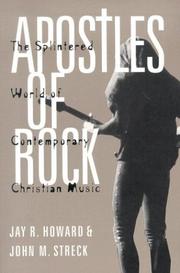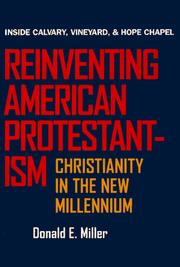| Listing 1 - 6 of 6 |
Sort by
|
Book
ISBN: 9780231172387 0231172389 9780231172394 0231172397 9780231539562 Year: 2015 Publisher: New York Columbia University Press
Abstract | Keywords | Export | Availability | Bookmark
 Loading...
Loading...Choose an application
- Reference Manager
- EndNote
- RefWorks (Direct export to RefWorks)
Jesus People --- Evangelicalism --- Christian rock music --- History
Book
ISBN: 0674919726 0674919742 0674980840 Year: 2018 Publisher: Cambridge, MA : Harvard University Press,
Abstract | Keywords | Export | Availability | Bookmark
 Loading...
Loading...Choose an application
- Reference Manager
- EndNote
- RefWorks (Direct export to RefWorks)
When rock 'n' roll emerged in the 1950s, ministers denounced it from their pulpits and Sunday school teachers warned of the music's demonic origins. The big beat, said Billy Graham, was "ever working in the world for evil." Yet by the early 2000s Christian rock had become a billion-dollar industry. The Devil's Music tells the story of this transformation. Rock's origins lie in part with the energetic Southern Pentecostal churches where Elvis, Little Richard, James Brown, and other pioneers of the genre worshipped as children. Randall J. Stephens shows that the music, styles, and ideas of tongue-speaking churches powerfully influenced these early performers. As rock 'n' roll's popularity grew, white preachers tried to distance their flock from this "blasphemous jungle music," with little success. By the 1960s, Christian leaders feared the Beatles really were more popular than Jesus, as John Lennon claimed. Stephens argues that in the early days of rock 'n' roll, faith served as a vehicle for whites' racial fears. A decade later, evangelical Christians were at odds with the counterculture and the antiwar movement. By associating the music of blacks and hippies with godlessness, believers used their faith to justify racism and conservative politics. But in a reversal of strategy in the early 1970s, the same evangelicals embraced Christian rock as a way to express Jesus's message within their own religious community and project it into a secular world. In Stephens's compelling narrative, the result was a powerful fusion of conservatism and popular culture whose effects are still felt today.
Rock music --- Christian rock music --- Fundamentalism --- Religious aspects --- Christianity. --- History and criticism. --- History.
Book
ISBN: 135009482X 1350094803 Year: 2020 Publisher: [London, England] : [London, England] : Bloomsbury Academic, Bloomsbury Publishing,
Abstract | Keywords | Export | Availability | Bookmark
 Loading...
Loading...Choose an application
- Reference Manager
- EndNote
- RefWorks (Direct export to RefWorks)
"Christian punk is a surprisingly successful musical subculture and a fascinating expression of American evangelicalism. Situating Christian punk within the modern history of Christianity and the rapidly changing culture of spirituality and secularity, this book illustrates how Christian punk continues punk's autonomous and oppositional creative practices, but from within a typically traditional evangelical morality. Analyzing straight edge Christian abstinence and punk-friendly churches, this book also focuses on gender performance within a subculture dominated by young men in a time of contested gender roles and ideologies. Critically-minded and rich in ethnographic data and insider perspectives, Christian Punk will engage scholars of contemporary evangelicalism, religion and popular music, and punk and all its related subcultures."--
Rock music --- Punk culture. --- Religious aspects --- Christianity. --- Christian rock music --- History and criticism.
Book
ISBN: 1501331698 1501331671 150133168X Year: 2019 Publisher: London ; New York : Bloomsbury Academic,
Abstract | Keywords | Export | Availability | Bookmark
 Loading...
Loading...Choose an application
- Reference Manager
- EndNote
- RefWorks (Direct export to RefWorks)
"Late in the Reagan years, three young men at Jerry Falwell's Liberty University formed the Christian rap group dc Talk. The trio put out a series of records that quickly secured their place at the forefront of contemporary Christian music. But, with their fourth studio album Jesus Freak (1995), dc Talk staked a powerful claim on the worldly market of alternative music, becoming an evangelical group with secular selling power. This book sets out to study this mid-90s crossover phenomenon - a moment of cultural convergence between Christian and secular music and an era of particular political importance for American evangelicalism. Written by two queer scholars with evangelical pasts, Jesus Freak explores the importance of a multifarious album with complex ideas about race, sexuality, gender, and politics - an album where dc Talk wonders, 'What will people do when they hear that I'm a Jesus freak?' and evangelical fans stake a claim for Christ-like coolness in a secular musical world."--Bloomsbury Publishing.
Christian rap (Music) --- Christian rock music --- History and criticism. --- DC Talk (Musical group).

ISBN: 081319086X 0813148057 9780813148052 9780813121055 9780813190860 0813127165 Year: 1999 Publisher: Lexington, Kentucky : The University Press of Kentucky,
Abstract | Keywords | Export | Availability | Bookmark
 Loading...
Loading...Choose an application
- Reference Manager
- EndNote
- RefWorks (Direct export to RefWorks)
Apostles of Rock is the first objective, comprehensive examination of the contemporary Christian music phenomenon. Some see CCM performers as ministers or musical missionaries, while others define them as entertainers or artists. This popular musical movement clearly evokes a variety of responses concerning the relationship between Christ and culture. The resulting tensions have splintered the genre and given rise to misunderstanding, conflict, and an obsessive focus on self-examination. As Christian stars Amy Grant, Michael W. Smith, DC Talk, and Sixpence None the Richer climb the mainstream
Christian rock music --- Jesus rock music --- Rock music, Christian --- Contemporary Christian music --- Rock music --- History and criticism.

ISBN: 0520922662 0585057133 9780520922662 9780585057132 0520209389 9780520209381 0520209389 Year: 1999 Publisher: Berkeley, California : University of California Press,
Abstract | Keywords | Export | Availability | Bookmark
 Loading...
Loading...Choose an application
- Reference Manager
- EndNote
- RefWorks (Direct export to RefWorks)
During the past thirty years the American religious landscape has undergone a dramatic change. More and more churches meet in converted warehouses, many have ministers who've never attended a seminary, and congregations are singing songs whose melodies might be heard in bars or nightclubs. Donald E. Miller's provocative examination of these "new paradigm churches"--sometimes called megachurches or postdenominational churches shows how they are reinventing the way Christianity is experienced in the United States today. Drawing on over five years of research and hundreds of interviews, Miller explores three of the movements that have created new paradigm churches: Calvary Chapel, Vineyard Christian Fellowship, and Hope Chapel. Together, these groups have over one thousand congregations and are growing rapidly, attracting large numbers of worshipers who have felt alienated from institutional religion. While attempting to reconnect with first-century Christianity, these churches meet in nonreligious structures and use the medium of contemporary twentieth-century America to spread their message through contemporary forms of worship, Christian rock music, and a variety of support and interest groups. In the first book to examine postdenominational churches in depth, Miller argues that these churches are involved in a second Reformation, one that challenges the bureaucracy and rigidity of mainstream Christianity. The religion of the new millennium, says Miller, will connect people to the sacred by reinventing traditional worship and redefining the institutional forms associated with denominational Christian churches. Nothing less than a transformation of religion in the United States may be taking place, and Miller convincingly demonstrates how "postmodern traditionalists" are at the forefront of this change.
Protestant churches --- Pentecostal churches --- Calvary Chapel movement. --- Calvary Chapel movement --- Christianity --- Religion --- Philosophy & Religion --- Calvary Chapel ministries --- Christian sects --- Pentecostalism --- Protestant sects --- Protestantism --- Forecasting. --- Case studies. --- Forecasting --- Case studies --- Calvary Chapel (Costa Mesa, Calif.) --- Hope Chapel (Hermosa Beach, Calif.) --- Vineyard Christian Fellowship. --- Costa Mesa, Calif. --- Costa Mesa (Calif.). --- California, Southern --- United States --- Southern California --- Religious life and customs. --- Church history --- New paradigm churches --- american culture. --- american protestants. --- american religion. --- american society. --- calvary church. --- christian rock music. --- christianity. --- churches. --- congregations. --- hope chapel. --- institutional religion. --- mega churches. --- ministers. --- new paradigm churches. --- post demonizational churches. --- postmodern traditionalists. --- protestantism. --- reinventing traditional worship. --- religion. --- religious studies. --- second reformation. --- sociology. --- united states of america. --- vineyard christian fellowship. --- worship.
| Listing 1 - 6 of 6 |
Sort by
|

 Search
Search Feedback
Feedback About UniCat
About UniCat  Help
Help News
News